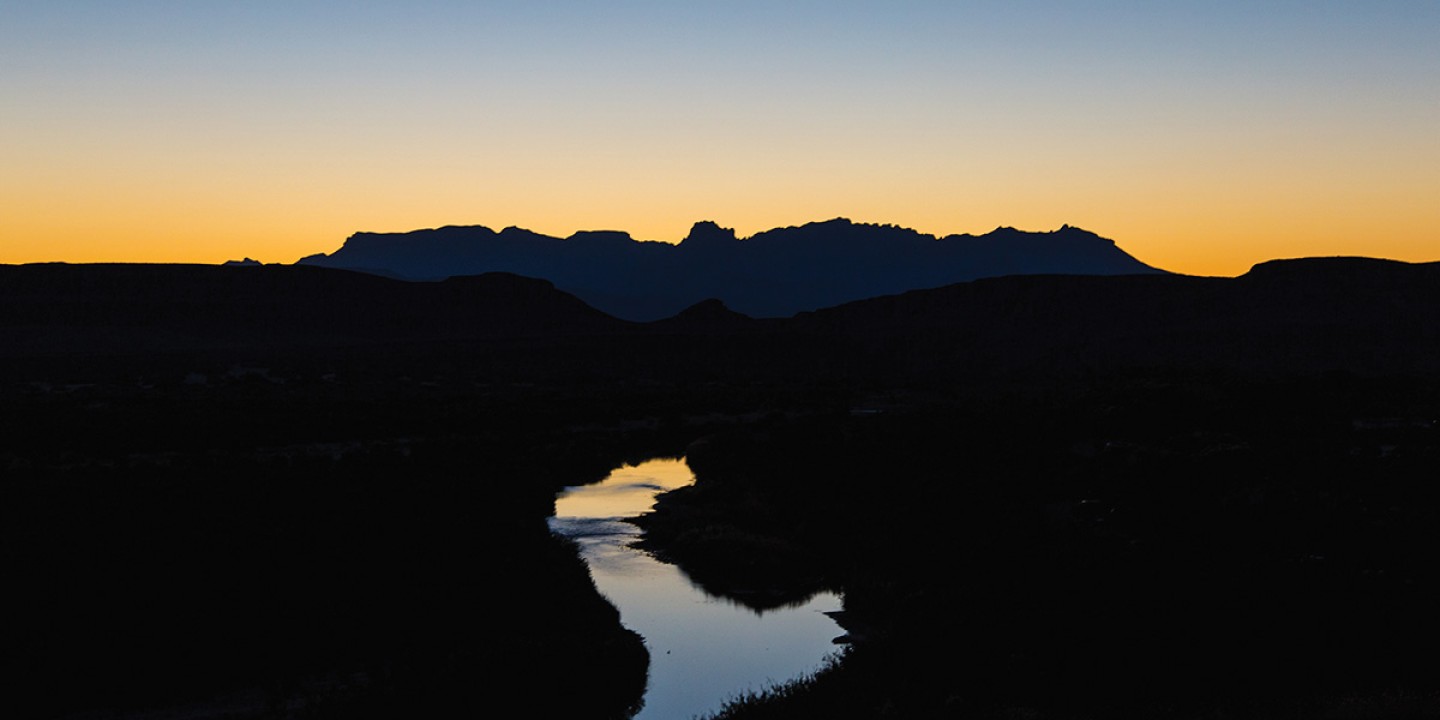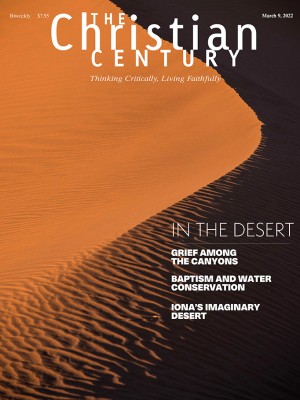The Didache’s ancient wisdom on baptism lands differently in a megadrought
Faith and water conservation in the desert

My daddy was a gas engineer for Amoco. Every evening when he crossed the threshold into our house from work, he’d note the price crude oil was trading for, reckoning how much it had risen or fallen since the day before. He was a Mensa member, a pilot, and a competitive tennis player. Most of all he was the father of three daughters, and he delighted in astonishing them. One day in the mid-1970s Dad sauntered to the dinner table and announced, “Girls, in your lifetime water is going to become more valuable than oil.” We laughed until our bellies ached at his wildly implausible prediction.
That memory floated to the surface one morning when my alarm sounded at 4 a.m. for prayer. I’d been getting up an hour earlier than usual to pray for the G20 meeting in Rome and the Glasgow climate summit. My father’s wildly implausible prediction is rapidly upon us. It’s here, in my lifetime, just as he postulated.
Read our latest issue or browse back issues.
The preciousness of water is a theme in my life. I grew up with well water rather than a municipal water supply, and my family’s well-being depended upon the well not running dry. My anxious father timed each of his daughters’ showers, reading in his chair just beyond the bathroom door where he could listen to the water running. If we transgressed the three-minute limit, Dad’s raps on the bathroom door signaled that time was up. Throughout my life I watched my mother carry water she’d already used several times (to wash veggies, then dishes, and then the floor) to her cotton-candy pink impatiens that lined our back door. Standing in front of the sink with the water running while brushing one’s teeth was nearly a capital offense.
There was a basin filled with water for washing hands throughout the day. Washing our hands under streaming water was a luxury afforded us only at school, where municipal water flowed as if there were no end to it. Our well and its delicious, 57-degree water was the sixth member of our family. We guarded it with a vigilance typically reserved for human beings.
The ever-present problem of conserving water is also part of my faith tradition’s story. When I began teaching worship at a seminary with students spanning 26 denominations, finding common ground proved complicated. So I began each semester by inviting my students to read the baptism passage from the Didache out loud to one another in class. It’s the passage in which we discover that in this earliest surviving record of Christian liturgical instruction—perhaps as early as 80 CE, possibly from Egypt or Syria—the method of baptism doesn’t ultimately matter so much as the pragmatics of water: How much water is available, and of what kind?
Now about baptism: this is how to baptize. Give public instruction on all these points, and then baptize in running water, in the name of the Father and of the Son and of the Holy Spirit. If you do not have running water, baptize in some other. If you cannot in cold, then in warm. If you have neither, then pour water on the head three times in the name of the Father, Son, and Holy Spirit.
Each semester I thanked God that the Didache had survived the centuries, testifying to an era before Christians developed countless dogmatic lines in the sand dividing us from one another based on the minutiae of baptism. Baptize through immersion in running water. But if you lack that? No problem! Use “some other” water. If you don’t have running water, then cold would be preferred. But if you lack that? No problem! Use warm. If you have neither running nor cold nor warm water, use a few precious sprinkles of water. The Didache’s entire baptismal instruction can be reduced to this: appropriate the liturgy to fit the water source you have available.
Perhaps the baptism squabbles began when Christians moved out of the desert and into locations with plentiful water. Because frankly, the desert wisdom of the Didache didn’t completely land for me until I myself moved to the desert, where today our water reservoirs stand empty and the land is so dry that a new term had to be coined: megadrought.
It’s frightening. Suddenly the preciousness of water takes center stage: the line “if you do not have running water” conjures up our formerly mighty Rio Grande now reduced to a trickle and, in many places, a dry bed. I’m intrigued too by the Didache’s preference for cold water over warm, because cold water is truly a rare commodity in the desert these days. Perhaps the scarceness of cold water influences the Didache’s author to prefer it? Regardless, turn the cold water tap on in any sink in my home and what flows forth is bathwater warm, the county water lines having been blasted throughout the day by the desert’s unrelenting sun.
When I first moved to the desert, beloved friends who’d been desert dwellers for decades drove up to Santa Fe to visit me. As I rushed out the front door to greet them, they each emerged from the car, turned away from the front door (and me!), and walked toward a juniper in my front yard. Then, careful not to spill a drop on the ground, each of them emptied the melted ice from their travel cups onto the tree. Then and only then we greeted one another.
I made a note of their conservation of water and thought of it time and time again. I thought of the countless number of times my mother had done the same thing with the small spoonful of water remaining in her glass from melted ice of what had been iced tea. It occasioned her lovingly bending over a thirsty plant and giving it a drink.
Like my mother before me, I reuse a dishpan of water three or four times before carrying it to my backyard to give my junipers and desert grasses a drink. It’s wildly inconvenient. But as I pour the water onto my aching plants—surely, like the psalmist, they too ache in this dry and weary land—and smell the fragrance of the water as it spits and sizzles onto the hot sand, I carry that passage of the Didache with me, baptizing all day long every plant and every living creature, longing and praying for rain.
Baptizing or receiving baptism, we all wait, both human and animal. Last May, as the heat was settling deep into the arroyo just beyond my back door, I watched—paralyzed with shock and disbelief—as a coyote made her way to the birdbath in our backyard. As she thirstily drank, the birds patiently waited in my juniper, lined up like planes waiting to land at O’Hare. A quick glance at her body revealed that she was a nursing mother. My heart wrenched at the thought of the monumental task of nursing coyote pups in the midst of a megadrought, every natural water source dried up.
Our vulnerability, hers and mine, is so clearly revealed in our most common experience: thirst. Christ’s words on the cross, “I thirst,” reverberate through all creatures suffering inadequate rainfall and water. The World Health Organization reports that last year more than 2 billion people lived in water-stressed countries and 3.6 billion had inadequate access to water. And that doesn’t begin to number the birds, rabbits, bobcats, mountain lions, and coyotes that thirst in drought with us. Innocent creatures suffer on crosses of drought that we humans have created.
Jesus’ ministry underscored water’s intrinsic value, its vital place in creation. He did some of his best work with water: the wedding at Cana, conversing with the Samaritan woman at the well, stilling the storm. Arguably we too, 20 centuries later, do some of our best work with water. Maybe it’s time to acknowledge the precariousness and preciousness of water as we baptize in the myriad ways encouraged by the Didache. Maybe our baptisms can connect us not only to the waters of creation but also to the stewardship of those waters.
A version of this article appears in the print edition under the title “Baptize with what you have.”





